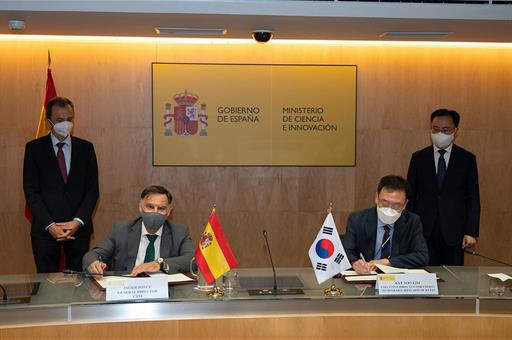Spain and the Republic of Korea sign an agreement to strengthen technological collaboration in the field of energy
News - 2021.6.16
In force until 2025, the goal of this agreement is to improve the competitiveness of companies in both countries through industrial research and technology development in the field of energy. This agreement is the framework within which the Bilateral KSEI Programme (Korea & Spain Energy Innovating Programme) is developed.
This new agreement has been formalised by the Director General of the Centre for the Development of Industrial Technology (CDTI), Javier Ponce, and the Executive Director of Energy Technology Dissemination of the Korea Institute of Energy Technology Evaluation and Planning (KETEP), Kye soo Kim.
The Republic of Korea is an excellent partner for Spain in terms of technological-industrial collaboration. In the scientific field, both countries have extensive experience and share similar interests in the development of technologies of great importance for strategic sectors such as energy, connected industry, transport, biotechnology and health, among others.
Institutional relations
With the aim of promoting and boosting scientific and technological cooperation, Spain has signed two Memoranda of Understanding that are fostering the development of technological projects between the two countries. The first of these was signed in 1996 between the then Spanish Ministry for Industry and Energy and the Korean Ministry of Trade, Industry and Energy (MOTIE). Subsequently, in 2015, this first agreement was renewed and a second agreement was signed between the Spanish Ministry of Economy and Competitiveness and the Ministry of Science and ICT (MSIT) of Korea.
Under the MoU signed with MOTIE, CDTI, as the main Spanish innovation agency, and the Korea Institute for Advancement of Technology (KIAT) and the Korea Institute of Energy Technology Evaluation and Planning (KETEP) signed MoU (in 2016 and 2017, respectively) that provide the framework for bilateral calls under the Eureka initiative and the KSEI programme.
In addition, under the MoU signed with MSIT, CDTI and the Korean organisation IITP signed another MoU, in 2020, which frames the KRESIP programme, focused on ICT technologies.
Grants offered by the CDTI
The management of international programmes and grants available to the CDTI requires the flexibility and dynamism to adapt to the needs of industry at all times. For those Spanish companies interested in developing a technological project in collaboration with companies and entities from this Asian country, the CDTI offers Spanish companies a type of aid aimed at the creation or significant improvement of a production process, product or service.
These grants are included in the type known as International Technological Cooperation R&D Projects. Companies can obtain aid in the form of a Non-Refundable Tranche of up to 33% of the Spanish financeable budget, provided that their proposal has previously obtained certification as an International Project.
Bilateral Programmes
The CDTI has established technological cooperation agreements with many countries around the world, including the Republic of Korea. Bilateral programmes form part of this international cooperation framework. Bilateral projects are considered those where both the CDTI and its international counterpart have jointly signed certificates attesting that these projects have followed the agreed international evaluation procedures and processes.
In the case of bilateral projects with the Republic of Korea, calls for proposals are regularly published. Under the Eureka initiative, there is a call with several closing dates each year. Projects of all technology types can be submitted to this call. In the case of the KSEI programme, it is exclusively dedicated to energy technologies. Finally, calls for proposals are also available under the KRESIP programme, which focuses on ITC technologies.
In all calls, the consortium must be formed by at least one Spanish company and one Korean entity.
Non official translation





